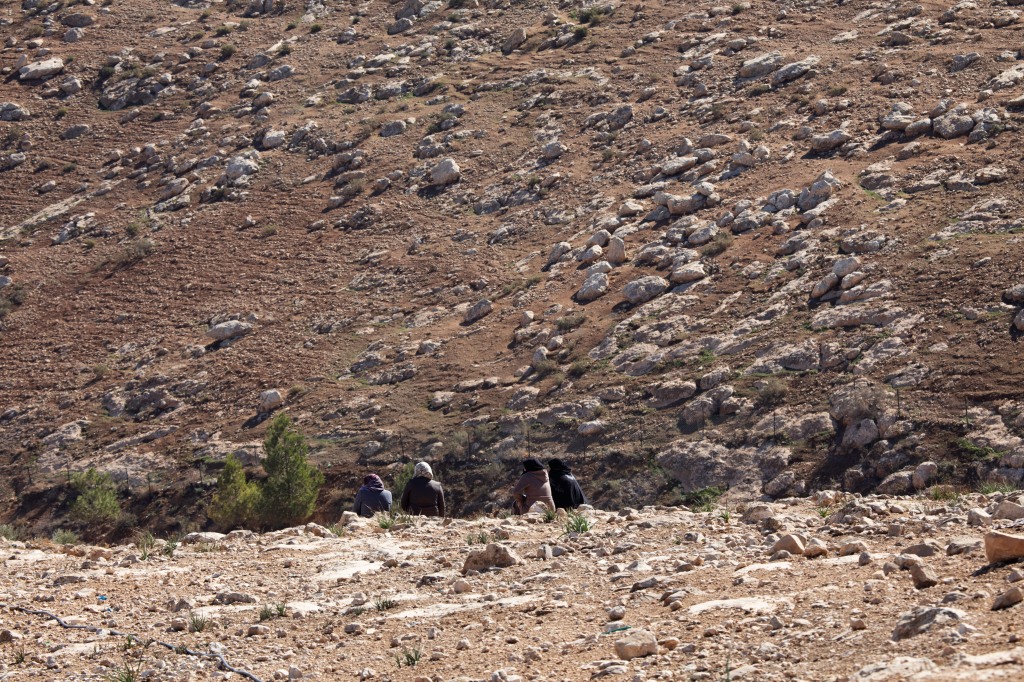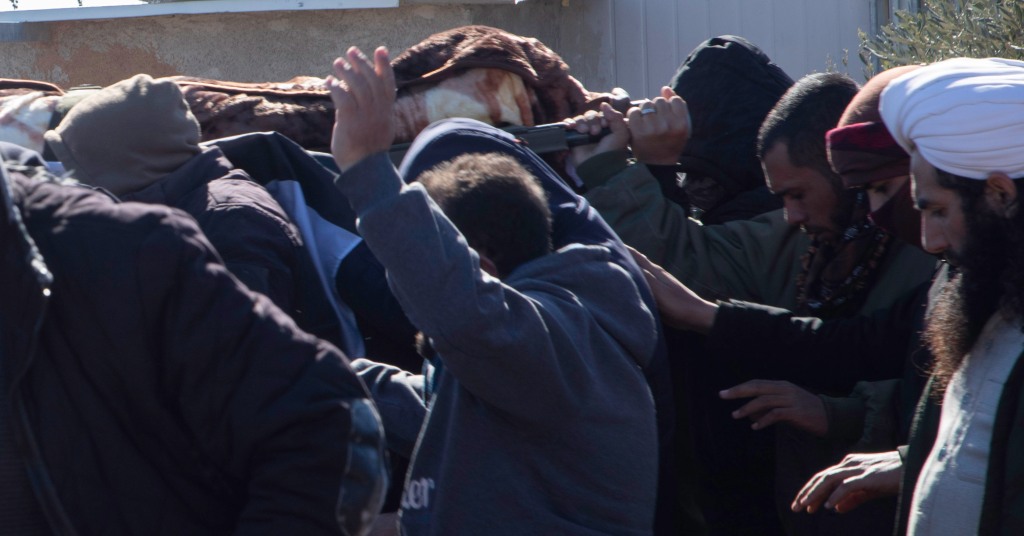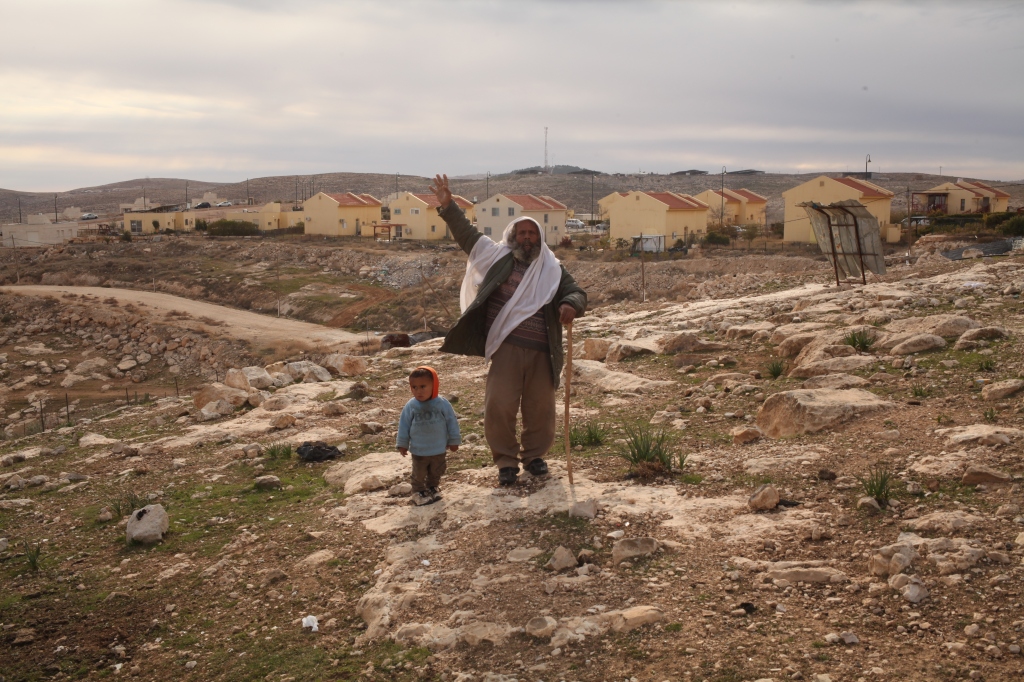Text by David Shulman
Photographs by Margaret Olin
Touching Photographs, January 20, 2022

He was like one of those rocky hills in South Hebron, a living, breathing, feeling mass of sunlight, rain, wind, earth, and stone. Though he wasn’t all that tall, he always dwarfed everyone around him. The soldiers and the border police were afraid of him, because he told them the truth and gave no quarter.

He was unafraid. He hated violence. Israel hurt him into fiery protest—everywhere where wrong was being done, he was there, that is, everywhere in South Hebron. Countless times he faced the soldiers down and shamed them with his words. He was the father of our good friend, ‘Id. I’ve known him for close to twenty years. I thought he was indestructible. I was wrong. They got him. He died a particularly horrible death at the hands of his enemies. His name was Hajj Suleiman Hadhalin.

I last saw him about a month ago, at Tuba, where, as so often, the soldiers had arrested him. He had turned up to harangue them for what they were doing to the people of Tuba. They had him sitting, handcuffed, for some hours in an army jeep with a soldier. The soldier was sick and at one point passed out. Hajj Suleiman, true to character, managed somehow to catch the soldier’s head and hold it in his hands before it collided with the metal dashboard.

January 5, 2022. Hajj Suleiman came home to Umm al-Khair from a funeral. It was early afternoon. The driver of a police tow-truck, accompanied by another car with a policeman and a soldier, was busy confiscating unlicensed cars. I’d better say something about the unlicensed cars, mashtubot, as they’re called in Arabized Hebrew. There are lots of them in the South Hebron hills. That’s partly because the army won’t let Palestinians build roads, so they are left with the dirt paths filled with potholes and jagged rocks, and they have to use those roads to get water and other necessities. Any car wears out after a couple of years on those paths. For cars to be roadworthy, it helps to have roads.

Apart from that, Israel controls the importing of any vehicles from Israel into the West Bank. The supply is severely limited, and the price of second-hand vehicles is over ten times higher than their cost in Israel. Since Palestinian shepherds and farmers can’t afford to buy halfway-decent second-hand cars, they buy these barely viable wrecks, most of them brought into Palestine allegedly for repairs but then sold. There is no way they would be licensed. Then the police, and sometimes even the Palestinian Authority, come, as logic demands, to confiscate them. For the owners, the risk of driving an unlicensed car is no doubt less than the risk of death by thirst or starvation.

That afternoon the confiscation was proceeding apace, and the villagers came to watch, and some of them may have thrown some rocks, though Hajj Suleiman pleaded with them not to. Then he stood, as always, smack in front of the tow-truck and wouldn’t budge. And the driver, a settler from Kiryat Arba’, drove right over him and dragged him for some ten meters over the rocks. Later, the police released an obviously mendacious version of what happened, including a poignant, also ironic, final sentence affirming that “the police will continue to do whatever has to be done in order to ensure good governance (mshilut).” They said the driver of the tow-truck and the other two were afraid, which might be true. The camera in the tow-truck probably recorded those moments, but it’s not at all certain, or even likely, that anyone will ever get to watch that footage.
There wasn’t much left of Hajj Suleiman after being run over. He had a gaping hole in his skull, his spinal cord, his pelvis, and many of his inner organs were crushed, he was bleeding profusely, and of course he was unconscious. The driver and the other police car took off without even stopping to see what had happened to their victim, the person they had just mortally injured, or calling an ambulance—as anyone involved in an accident is required to do by Israeli law. They presumably didn’t think that an elderly Palestinian man fits the category of “person.”

The villagers got him to hospital, where he lingered, unconscious, for a few days, but in fact, as ‘Id says, he was no longer alive in any meaningful sense when he got there. The people of Umm al-Khair have been orphaned.

The South Hebron Hills were closed down today in his honor, and thousands came to accompany him to his grave in the village cemetery deep in the wadi, at the edge of the desert. Umm al-Khair has never seen such a crowd.

The slopes were alive with people, mostly men, a vast cascade pouring downhill to the grave site. No one, with the possible and intermittent exception of our activists, was wearing a mask. Some men had their faces covered with their white or checked keffiyeh.

The bier passed beside me, the body draped in a Palestinian flag. Women are not supposed to come to the cemetery, so Peg joined them at a high vantage point in the village …

where a ban on photographing the women’s faces, and reticence, prevented her from documenting the tears, prayers, the warm welcome from old and new friends, and the occasional outburst that greeted her.


I couldn’t walk all the way down because of a torn ligament, but I hobbled far enough to be able to hear the eulogy and the prayers. The words were moderate and restrained compared to other speeches I’ve heard. “The Palestinian people continuously faces the forces of oppression, zulum—settlements, army, police, all of them stealing more and more land. We face them here in Umm al-Khair and in Twaneh and in Susya and in Mufagara and in Yata and in al-Khalil and everywhere else. We refuse to give in. We persist, we will face them in the name of Hajj Suleiman, who died a martyr; for his sake, and for the nobility of his soul and his courage, we will go on, if necessary forever, or until justice is done. God will be with us.”

It was like listening to the desert singing, in wave after wave, a threnody for a rare being. A cold, sun-drenched day, the hills of Moav across the River glowing in every crack and crevice. I sat on a rock, trying to believe that Hajj Suleiman, one of the most alive human beings I’ve known, had somehow been compressed into that green-draped bier. I watched the men go down and, an hour later, climb back up. Many friends were there: ‘Ali ‘Awad from Tuba; Nasser from Susya; Ramzi, Harun’s father, from A-Rakiz. Enough tragedy and suffering to go around. Many I didn’t know greeted me with words of welcome. Everyone knows of Ta’ayush in the South Hebron hills.

I was thinking: there is no end to the utter foolishness of Israel; they think they can pen all these people in as if they were goats and leave them to die of sorrow and thirst, they think they can take all their land and kill some of them day by day, and get away with it, since no one even notices, and someday the Palestinians will give up; but the very idea is absurd. Someday there will be an end.

For what it’s worth, I mention this thought to Amiel as we sit outside the mourners’ tent after we have made the rounds inside, speaking the formulas of comfort. “May the days he—Hajj Suleiman—wasn’t able to live be accredited to your account.” And so on. And Amiel says, “So far that absurd idea is working quite well.”
Text © 2022 David Shulman; photographs @ 2022 Margaret Olin

Leave a Reply
You must be logged in to post a comment.